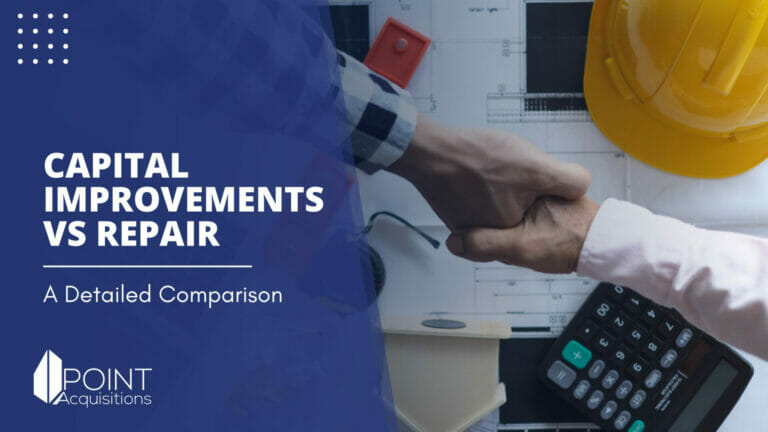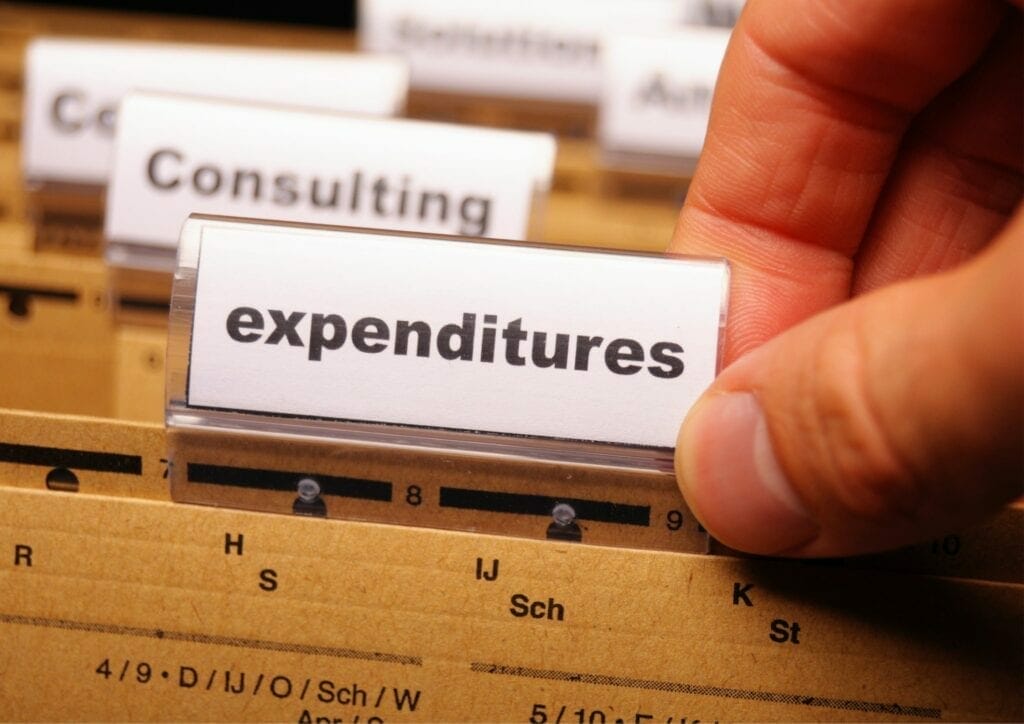
Maintenance vs Capital Improvements
If you’re a property owner, one of the questions you may ask yourself is whether to invest in maintenance repairs or capital improvements. Both have benefits, but deciding the right choice for your property can be tough. In this article, we’ll look at the advantages and disadvantages of each choice, maintenance and capital improvement examples and some handy tips so you can determine which is best for your needs.

Table of Contents
Maintenance vs Capital Improvements: Know the Difference
As a property owner, it’s important to know the difference between maintenance and capital improvements. Maintenance is the regular, ongoing care of your property, such as painting, repairs, and landscaping. Capital expenses are often larger projects/improvements to the infrastructure of your property and will often add value to your property, such as a new roof, facade work, or mechanical, electrical, and plumbing (MEP) work.
While both are necessary to keep your property in good condition, they each have different implications for your budget and taxes. Maintenance is typically an ongoing expense, while property capital improvements can be costly upfront but may save you money in the long run.
What is capital improvement?
A capital improvement can come in different shapes and sizes. Still, it is often associated with improving the property substantially and extending its expected useful life function, which it increases the overall value of the property. What are examples of capital improvements?
Common examples of capital improvement include adding a bedroom or bathroom, renovating an existing space, installing new windows, repointing brick, replacing MEPs, and replacing the roof.
Benefits of Capital Improvements
There are several advantages to investing in capital improvements:
- They can increase the value of your property.
- They can make your property more attractive to potential buyers or tenants.
- They can extend the property’s condition.
Drawbacks of Capital Improvements
Capital improvements can also have some drawbacks:
- Initial costs can be expensive.
- They may require permits or other approvals from your local government.
- They can be disruptive to your tenants or neighboring residents.
What is a maintenance improvement?
Maintenance expenses are typically much lower than capital improvement expenses. Maintenance typically includes scheduled repairs and replacements of worn-out parts, while capital improvements are major upgrades or renovations.
Benefits of Maintenance Improvements
There are several benefits to investing in maintenance improvements:
- Preventative maintenance can keep small problems from becoming big ones.
- They can improve the appearance of your property.
- They can help you avoid more future operating costs down the road.
- A super or general maintenance person can handle maintenance without needing a specialist.
- They are immediately tax-deductible
Drawbacks of Maintenance Improvements
There are a few potential drawbacks to maintenance expenses:
- They may not increase your property value as much as a major capital improvement.
- They may not make your property attractive to potential buyers or tenants.
- It may not get to the root of a repair problem, as general maintenance is simply a bandaid.

Making the Decision: Maintenance vs Capital Improvements
So, how do you decide whether to invest in maintenance repairs or capital improvements? The answer will vary depending on your investment strategy, goals, and needs.
However, here are a few general guidelines:
- A capital improvement is typically a better choice if you’re looking to increase your property value.
- If you want to make your property’s original condition more attractive to potential buyers or tenants, either option could work.
- If you’re looking to extend the property’s original value, capital improvements may be a better choice.
Of course, every situation is unique. You’ll need to weigh the pros and cons of each option carefully to decide which is best for your property.
Know ‘Useful life.’
When deciding whether to repair or replace, one important factor is the “useful life.” For example, the useful life of a roof may be 20-30 years, while the expected lifespan of central air conditioning is only 15-20 years. So if you have an old roof and central A/C nearing the end of their useful lives, you may have to make some tough choices.
Another factor to consider is the cost of repair or replacement. If repairing your old roof costs nearly as much as installing a new one, it may make sense to replace it. The same goes for central A/C. Replacing an old unit may cost more upfront, but it could save you money in the long run by being more energy-efficient.
Again, your choice will be rooted in your forward-looking strategy – hold the property long term, or sell.
When should I do repairs or improvements?
The best time to do repairs or improvements is when it is most convenient for you. However, you should remember that some regular maintenance may need to be done to avoid further damage to your property. For example, if you have a hole in your roof, you’ll want to repair it as soon as possible to avoid water damage to your property.

Types of capital expenditures
Capital expenditures are typically larger projects that improve the value of your property or extend its useful life. Some examples of a capital improvement include:
- Adding or expanding to the existing asset
- Adding new equipment or machinery
- Upgrades/replacement of MEPs
- Renovating an existing space
- Replacing risers
- Converting gas to electric
- Replacing the entire roof or replacing the facade
- Replacing windows with higher R-value
Types of maintenance work
Maintenance work is typically smaller and is designed to keep your property in good condition. Some examples of maintenance work include:
- Patching a hole in the roof
- Fixing a broken window
- Painting the exterior of a building
- Repairing stair treads
- Replacing hallway lights from Halogen to LED
Cost basis
As you can see, it’s important to keep track of your expenses to know how much you’ve invested in your property. It is important to understand this because it will affect your gain or loss when you sell the property. For example, you paid $100,000 for a rental property and spent $20,000 on repairs and improvements over the years. If you sold the property for $200,000, your gain would be $80,000. However, if the property’s cost basis were $120,000 (because the repairs and improvements increased the property’s value), your gain would be only $60,000.

What deductions can I take for improvements?
You’ll need to speak with tax professionals to determine whether your repairs or improvements are eligible for a deduction. The answer to this question depends on several factors, including the type of improvement, when it was made, and how it was financed. For example, some improvements may be eligible for a tax deduction if they meet certain criteria.
Routine maintenance is not generally deductible because it does not add value to the property or extend its useful life. On the other hand, improvements may be eligible for a deduction if they meet certain criteria. An example of this would be if you made a change to your property that added value, the cost for the improvement could potentially be deducted. Again, we suggest you speak with a tax professional to determine whether your repairs or improvements are eligible for a deduction.
In conclusion
Property owners need to consider maintenance and capital improvements when planning for the future of their properties. Maintenance is essential to keep your property in good condition and prevent problems from worsening. Capital improvements can add value to your property but comes at a large capital outlay. Both expenses must be carefully considered to make the best decisions for your property.
About The Author

Jesse Shemesh
Disclaimer
Please note that Point Acquisitions is not a tax expert or tax advisor. The information on our blogs and pages is for general informational purposes only and should not be relied upon as legal, tax, or accounting advice. Any information provided does not constitute professional advice or create an attorney-client or any other professional relationship. We recommend that you consult with your tax advisor or seek professional advice before making any decisions based on the information provided on our blogs and pages. Point Acquisitions is not responsible for any actions taken based on the information provided on our blogs and pages.
1031 Exchange Capital Gains Tax Deferral
According to a 2021 report by the National Real Estate Exchange Services (RES), over 240,000 1031 exchange transactions were completed in the United States, totaling $100 billion. This impressive figure underscores the role of 1031 exchanges in the real estate…
Read More1031 Exchange Benefits
As of Q4 2023, the national vacancy rate for all commercial property types in the United States sat at 9.2%, according to CBRE’s latest insights and research. This represents a slight decrease compared to the previous quarter and suggests a…
Read More1031 Exchange Legal Considerations: A Must-Read Guide
You’re in the right place if you’re considering a 1031 exchange for your commercial real estate investments. Whether you’re a seasoned investor or just dipping your toes into the market, understanding the legal landscape of 1031 exchanges is key to…
Read More

